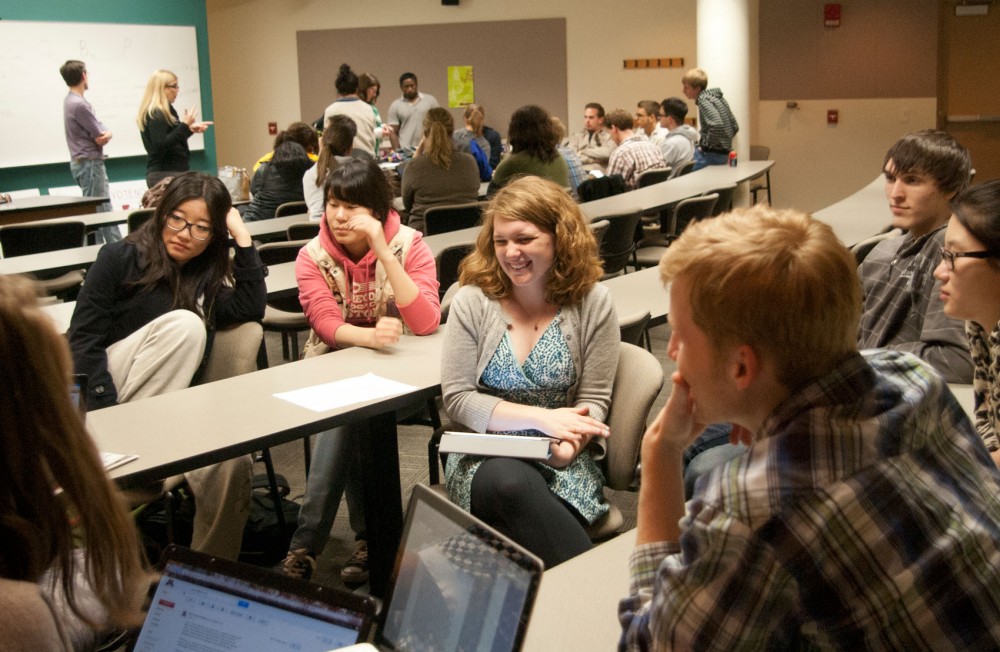A proposal that would allow voting in state and federal elections as an acceptable excused absence is floating around the University of Minnesota Senate.
The Minnesota Public Interest Research Group has proposed an amendment to the Makeup Work for Legitimate Absences policy, which covers all University campuses except Duluth and currently states that excused absences “do not include voting in local, state, or national elections.” If the policy is amended, voting would be an excused absence for students.
MPIRG member Mitch Menigo said the proposal is meant to encourage students to vote.
“Right now, we’re working on making it a legitimate excusal from class, but eventually we want to see it as an official University holiday for students,” Menigo said. “We’re doing this as a way of reflecting the importance of voting and making sure students do their civic duty by making it even easier for them to get to the polls.”
Chris Cramer, chair of the Faculty Consultative Committee in the University Faculty Senate, said there are alternative ways to manage the issue.
“This amendment would cause difficulty for instructors and would force them to reschedule classes and material,” Cramer said. “Rather than attempting to amend the current proposal, it might be better to request [Provost Karen Hanson] send a message to faculty to schedule less important content on election days and also remind students when Election Day is, so they could schedule accordingly.”
Cramer sent an email to MPIRG and members of the Student Affairs Committee and Student Senate Consultative Committee of the Student Senate discussing his concerns with the proposal.
Cramer said in his email that Hanson has the authority to handle the issue with the Faculty Senate, not the Student Senate.
Cramer said faculty members do not want to prohibit students from voting, but the proposal could have severe impacts on classes that meet only once a week.
If the Student Affairs Committee passes the amendment, the proposal will go to the Student Senate Consultative Committee. If that committee passes the resolution, it then moves to the Student Senate and University Senate Committee on Educational Policy.
The Faculty Senate approves all policy changes before they go to the provost, who would have the final say, Cramer said.
“I think it’s a commendable action by MPIRG,” said political science department Chair Raymond Duvall. “The political science department believes strongly that students should be informed citizens and participate in the democratic process by exercising their right to vote.”
Menigo said the proposal passed the Student Affairs Committee with mostly positive feedback. He said there were some wording obstacles, but MPIRG is working with the University Senate to change the questionable phrasing.
Joyce Holl, a co-chair of the Student Affairs Committee, said she supports the measure.
“I think there was a strong argument by MPIRG and that students need an opportunity to have their voice heard and exercise their right to vote,” Holl said. “Students have a lot to juggle, so this might help them out.”
Cramer cited in his email the “enormous flexibility” of absentee voting in Minnesota, but Holl said many students don’t utilize that option.
“We just want to make it as easy as possible for students to vote,” Holl said. “Students already have many hurdles here, and this would help remove one of the hurdles.”
Holl said there have been previous attempts to allow absences on Election Day, but they failed in the Committee of Education Policy.
Although the Student Affairs Committee passed a resolution supporting the change, Holl said the committee is going to revisit the actual policy language before sending it on.
University student Maria Calderon said the proposal wouldn’t make that much of a difference.
“Students could find time to vote at some point during the day,” Calderon said. “They’re not on campus all day.”
Polling places are open from 7 a.m. to 8 p.m. in Minnesota.
But senior Kurtis Rahkola said the proposal would provide an opening in his day.
“I’d probably be more likely to vote,” Rahkola said. “I went home freshman year to vote, so this would give me more time, which would be nice.”
MPIRG has been developing the idea since last spring and presented it to Vice Provost for Student Affairs Jerry Rinehart last fall. Menigo said Rinehart wasn’t completely in favor of the idea but helped with guidance and was receptive.
Menigo said he hopes the policy change will be in place by November’s elections.
“On campus, [MPIRG] is the biggest group for ‘Get out the vote’ campaigns,” Menigo said. “We got a lot of responses from students saying that they didn’t have enough time to vote. We want to make sure every voice is heard and everyone has an opportunity to vote.”


